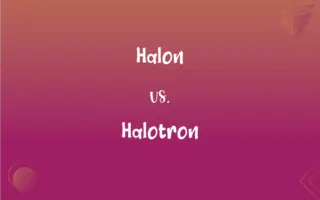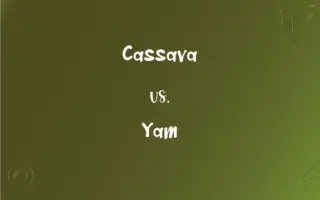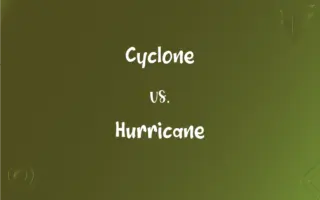Formal Groups vs. Informal Groups: What's the Difference?
Edited by Aimie Carlson || By Harlon Moss || Updated on October 3, 2023
Formal groups are structured and officially recognized entities, while informal groups are casual and emerge naturally based on relationships or interests.

Key Differences
Formal groups are established with a clear purpose or objective, often delineated by an organization or institution. Informal groups, conversely, arise organically, driven by social interactions or common interests among members.
Membership in formal groups often comes with designated roles, responsibilities, or titles. Informal groups lack such defined roles, and interactions are typically spontaneous and driven by personal dynamics.
Formal groups typically operate within established rules, guidelines, or by-laws. Informal groups function without such structures, relying more on mutual understandings or shared norms among participants.
In formal groups, the duration, frequency, and agenda of meetings are typically preset. In contrast, informal groups meet more sporadically without a fixed agenda, often driven by members' availability or interests.
The communication within formal groups tends to be more structured, often following specific channels or hierarchies. In informal groups, communication is free-flowing and unrestricted, relying heavily on personal rapport among members.
ADVERTISEMENT
Comparison Chart
Origin
Created by an organization or institution
Arise naturally based on relationships or interests
Structure
Defined roles and responsibilities
Lacks designated roles; more spontaneous
Governance
Operate with set rules or guidelines
No specific rules, based on mutual understanding
Meetings
Predetermined agenda and frequency
Meet as and when, without fixed agenda
Communication
Structured and often hierarchical
Free-flowing and based on personal rapport
ADVERTISEMENT
Formal Groups and Informal Groups Definitions
Formal Groups
Organized entities with a defined purpose.
The board of directors is one of the company's formal groups.
Informal Groups
Collections of people who communicate freely without set rules.
Many social media chat groups are considered informal groups.
Formal Groups
Structures created by institutions with specific roles.
Project teams are formal groups assigned to specific tasks.
Informal Groups
Groups formed organically without official recognition.
Fans of a particular show have created numerous informal groups online.
Formal Groups
Bodies with designated members and leadership.
The audit team, one of the formal groups, reviews the company's finances.
Informal Groups
Collections of individuals connected by friendships or common interests.
A group of coworkers lunching together forms one of the informal groups at the office.
Formal Groups
Groups that have regular meetings with a set agenda.
Management meets bi-weekly as part of their formal groups.
Informal Groups
Entities that function based on shared norms and mutual understanding.
A group of parents discussing school events is one of the informal groups in the community.
Formal Groups
Entities operating within official guidelines.
Committees in the senate are formal groups overseeing various sectors.
Informal Groups
Entities without a set structure or hierarchy.
Weekend biking enthusiasts are among the informal groups in the neighborhood.
FAQs
Is membership in formal groups more rigid?
Generally, yes, as formal groups often have specific criteria or procedures for membership.
Are formal groups always part of an organization?
Mostly, but formal groups can also exist independently with a specific objective.
Do informal groups have any rules?
They don't have official rules but operate based on mutual understanding and shared norms.
Can informal groups become formal over time?
Yes, informal groups can evolve into formal ones with structure and purpose.
How are conflicts resolved in formal groups?
Formal groups often have predetermined mechanisms or guidelines for conflict resolution.
Can formal groups exist online?
Yes, formal groups can function online, especially in today's digital age.
Are friendships a basis for informal groups?
Yes, friendships are a common foundation for many informal groups.
Can one be part of multiple informal groups?
Absolutely, informal groups are based on interests or relationships and one can belong to several.
Can you give an example of an informal group in a workplace?
Yes, employees gathering for coffee breaks form an informal group.
Why are informal groups important?
They foster camaraderie, provide social support, and can influence larger community or organizational dynamics.
Are decisions in formal groups always unanimous?
Not necessarily; decisions might be based on majority rule or specific voting mechanisms.
Are the goals of formal groups always clear?
Generally, yes, formal groups have clear objectives, but the clarity can vary.
Do formal groups always have a leader?
Typically, yes, formal groups have designated leaders or heads.
What binds members of informal groups?
Common interests, friendships, or shared experiences typically bind members of informal groups.
Who sets the agenda for formal group meetings?
Typically, the leader or designated members set the agenda for formal group meetings.
How are informal groups created?
Informal groups often form organically based on shared interests or social interactions.
Can informal groups influence formal decision-making?
Yes, informal groups, especially influential ones, can sway decisions in formal settings.
How are members chosen for formal groups?
Through set procedures, criteria, or nominations, depending on the nature of the group.
Do informal groups have membership criteria?
Typically, no. Membership is often based on mutual interest or relationships.
Can formal groups be temporary?
Yes, some formal groups, like task forces, are created for specific short-term objectives.
About Author
Written by
Harlon MossHarlon is a seasoned quality moderator and accomplished content writer for Difference Wiki. An alumnus of the prestigious University of California, he earned his degree in Computer Science. Leveraging his academic background, Harlon brings a meticulous and informed perspective to his work, ensuring content accuracy and excellence.
Edited by
Aimie CarlsonAimie Carlson, holding a master's degree in English literature, is a fervent English language enthusiast. She lends her writing talents to Difference Wiki, a prominent website that specializes in comparisons, offering readers insightful analyses that both captivate and inform.








































































